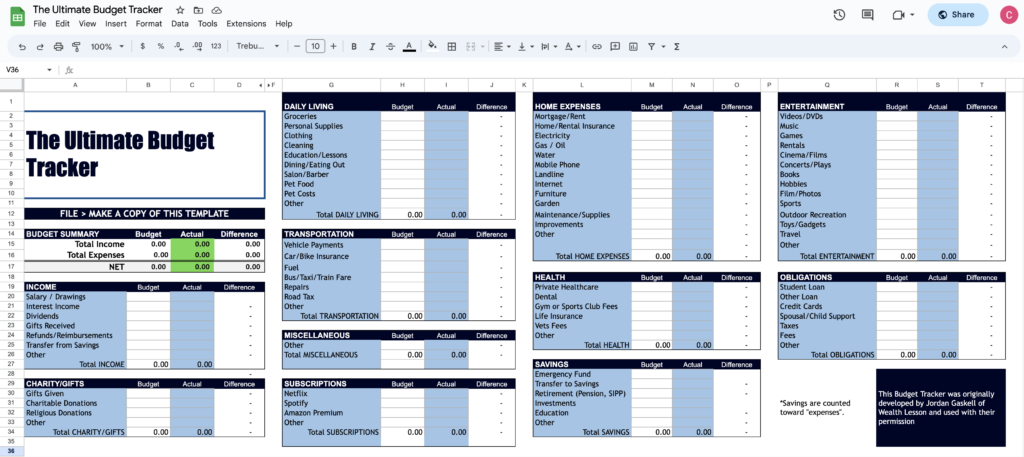Whether you earn £10,000 or £100,000, understanding how to budget money effectively is crucial to your financial success. Budgeting will help you to stay on top of bills by aiding more conscious spending. It will provide a much better position to save towards your own financial goals. The first step on any personal finance journey should focus on understanding where your money is going.
REASONS TO BUDGET MONEY
- Pay off your debts
- Save towards early retirement
- Plan for your next large purchase
- Provide financial security to start your own business
Regardless of your financial situation, a budget or an understanding of your income and expenses is a worthwhile task to undertake. With only minimal effort we’ll be able to take control and optimise our finances.
HOW TO SET UP A BUDGET
To get started on your first budget a little effort is expected. You need to work out your monthly income and what you spend each month. As an employee the first part is easy. Look at your payslip and match this against what you get into your bank account. This is your income. If you do odd jobs or have a side hustle, make sure to add this also. For Business Owners or Company Directors, any income such as dividends, salary or drawings is counted as income. This may be erratic and so a wider snapshot of time such as 3 months, may give you a rolling average of your income.
Expenditure
Once we know our income, our attention moves to expenditure. The golden rule to budget money is to spend less than we earn. After the first it does get much easier than you’ve a great understanding of your outgoings and money coming in. Most people will have a standard list of household expenses including:
- Household bills – Electricity, Heating, Internet, Mortgage or Rent
- Living costs – Food and Drink, Clothing
- Insurances
- Travel Costs – Car payments, fuel, insurance, or public transport and taxis
- Gifting or Charitable Donations
- Entertainment – Holidays, Activities, Eating Out, Subscriptions
It will take a little effort, but it’s a great way to get a quick understanding of where your money goes each month. Some bills are annual and so its best to allow for 1/12th of this in your monthly budget.
Look at your bank statement and take a note of all expenses you have in a month. Get as much information as you can and jot it down on paper or download your monthly statement into a spreadsheet. You can view our own Budget Planner by clicking here. If you have one off costs in this month, still add these to your budget. Every month is different, but more often than not, these little additions crop up. It’s best to overcompensate than under when budgeting.
WHY SET UP A BUDGET?
Our primary reason to budget money should be to reduce costs and to put all our unused income to work for us as investments. However, depending on where you are on your own financial timeline, budgeting may also help you to:
- Stay out of debt
- Plan for unexpected costs
- Help plan for a mortgage or loan (and get accepted for it)
- Optimise your savings in the short term (holidays or car) and long term (retirement, pension)
For most people, the first budget isn’t pleasant. Few of us are where we want to be financially and these warts and all view of your spending is usually a little uncomfortable. Most people will drastically underestimate what they spend until it’s written down on paper.
The simplest way to track your monthly spending is to use a single card for all of your purchases. This way, all of your transactions are in a single account and can be viewed/reviewed very easily. Using an online bank such as Monzo or Starling makes this incredibly straightforward, and they automatically categorise your spending into appropriate categories. There are many apps available to purchase or subscribe to that can help with your budgeting. For most people, pen/paper or a spreadsheet should be relatively easy and it only gets easier.
CREATING YOUR FIRST BUDGET

When I wrote this article on budgeting originally I had set aside some time to create a beautiful budget tracking spreadsheet that I could share with you. However, my good friend Jordan of Wealth Lessons did a sterling job on his own and well, I’m all for efficiencies! I’ve branded his up and added a few sections that may be more relevant to my own readers. It’s a very simple-to-use monthly budget planner and you can set up different sheets for each month by duplicating the original page.
Get the Ultimate Budget Tracker by clicking the link. Make sure to go to File and then Make a Copy, as this is the way to get it for yourself.
UNDERSTANDING YOUR BUDGET
If you’re spending more than you have coming in, we need to take immediate action. However, even those who are spending less than they earn should be taking big steps to reduce their outgoings. We’ll go through some easy and more advanced ways to cut back on future articles. Examples may include making your own lunch, skipping those £5 coffees or cutting back on meals out. It may even mean moving to a lower-cost-of-living area or closer to work.
To budget money effectively, you will understand your spending and you’ll have a greater understanding of your current fixed costs of living. From this, you’ll be able to optimise your spending and create a basic spending plan each month.
SAVINGS GOALS – 50% OF YOUR INCOME
To make big changes to our future, we need to aim BIG in terms of our monthly savings/investments. Our goal should be to save 50% of our income each month. Yes 50%! Saving 5-10% of your income each month is great as a starting point. As someone who wants to retire early, or very early in their 30s, 40s or 50s you need to save and invest big early on. Saving this much on most salaries requires some radical ideas for everyone in your household.
REDUCING YOUR MORTGAGE COST – Updated for 2023
We are beyond the era of unnaturally low-interest rates and now interest rates are at the highest they’ve been for the past 15 years. Keeping your mortgage or housing costs as low as possible has never been more of a necessity.
Now is the perfect time to review your mortgage to ensure you are on the best rate available. The “house hacking” phenomenon our American cousins proclaim is getting traction in the UK. You may want to bring in tenants or “lodgers” to help you with a rental income you can set against your mortgage.
REDUCING HOUSEHOLD COSTS
Household costs are usually one of the largest chunks of our monthly spending. They also prove to be some of the areas where the greatest savings can be made. Shop around for the best prices on all of your utilities and be mindful of your spending in all areas. Can you turn your heating down 1 degree? Not in my house we can’t but you might be able to. There are some great deals when renewing your internet or broadband account, but it might be better to look at new providers also. A 20-minute call can save you £5-10 per month.
SAVE ON TRAVEL COSTS
You do not need that expensive car. The PCP, running costs and fuel make this one of the best opportunities to reduce your spending and increase your savings.
With a budget in place, the large cost of an annual rail or bus pass can be spread across the year. In addition, savings can also be made.
WHAT TO DO WITH MY SAVINGS?
Our purpose should always be to maximise our monthly savings. This entire site is devoted to reducing costs, increasing income and maximising savings. With a positive saving rate, our goal should be to invest this money into income-generating investments. That might be any range of investment opportunities such as:
- Investments
- Rental Properties
- New Business Ventures
When we invest, our money goes to work for us. While some opportunities noted above are passive in their nature, others require more active involvement. You can check out our Investment series elsewhere on the site for a more in-depth look at each of these.
SAVING ON AUTO-PILOT – WORKPLACE PENSIONS
If you have a workplace pension, it’s usually recommended maximising your savings in this area before moving on to other such investment opportunities. Workplace pensions are subtracted from your Gross pay before tax is taken and also before the net balance is sent to your bank account. This is not only beneficial from a tax perspective. But as you never received the money into your bank account, there’s no way to spend it. In any given year, you can invest up to the annual allowance in your pension with the benefit of tax relief. For the 2020/21 tax year the annual allowance is £40,000.
PENSIONS AND EARLY RETIREMENT
For many the set-and-forget nature of workplace pensions is a perfect starting point to begin saving and investing for your retirement. However, the government has confirmed plans to increase the minimum pension age from 55 to 57 from 2028. There is a planned increase in the State Pension age to 67 and the minimum pension age will remain ten years below this. As an ambitious early retiree, the inability to access funds until a later stage in life gives pause for thought. You should consider how much to put into your pension before considering other options.
Pay Down Existing Debts
You may have some existing debts such as credit cards, store cards or personal loans. Depending on the interest rate of this debt, it may be prudent for you to pay this down promptly. For example, your investment returns are unlikely to be consistently over 10% (though we hope they are). With this said, it may be a better move to take those high-interest debts and to remove them. Once these debts are paid off this will also aid in providing a greater opportunity for saving each month.
SUMMARY
There’s a lot to take in within today’s post on how to budget money. There are even more points to take action on. Budgeting money is the foundation of your financial plan and it’s important you give it the appropriate consideration. The takeaways from today should be…..
- Make your budget simple, but track everything
- Spend less than you earn and invest the rest
- Increase your saving rate to a radical level – yes 50% is the goal
- Optimise, optimise, optimise!
Further Reading on how to budget money
If you want to find out more about how to budget money effectively, we’ve also collated a list of other resources. These resources focus on all aspects of budgeting: including budgeting when in debt or with large incomes. If this article doesn’t fit your needs, maybe one of those presented is more suited to your needs. If you can’t find what you are looking for, please drop us a message via the contact form. We’ll do our best to point you towards some suitable blogs to help you budget money.
- Money Advice Service – https://www.moneyadviceservice.org.uk/en/categories/budgeting-and-managing-money
Frequently Asked Questions
What is the 50/30/20 rule of money in budgeting?
The 50/30/20 rule of money is a budgeting technique that many people find easy to understand and implement. Using the 50/30/20 rule, 50% of your net income is spent on necessities, 30% on discretionary spending and 20% is put away towards savings for your future.


